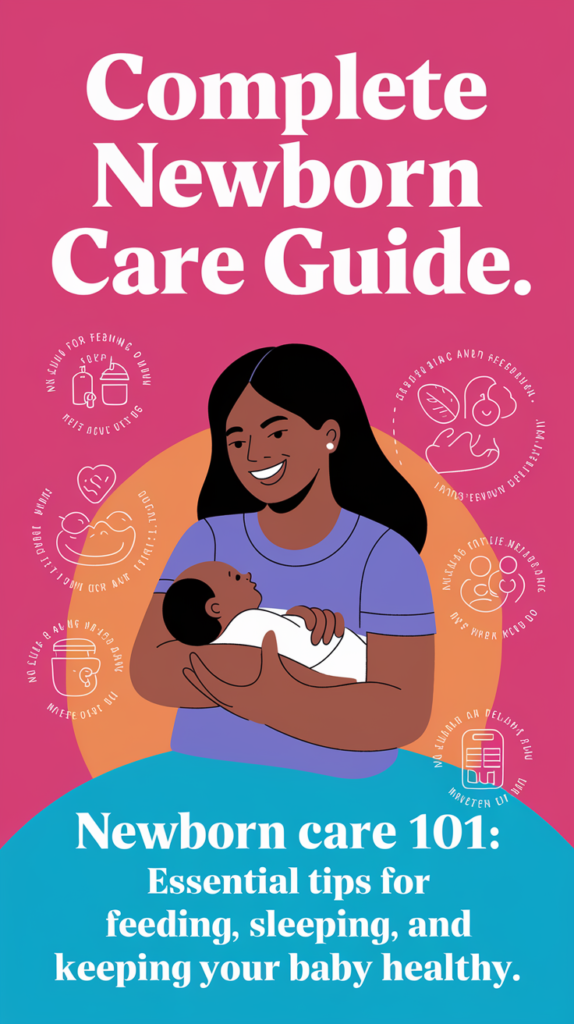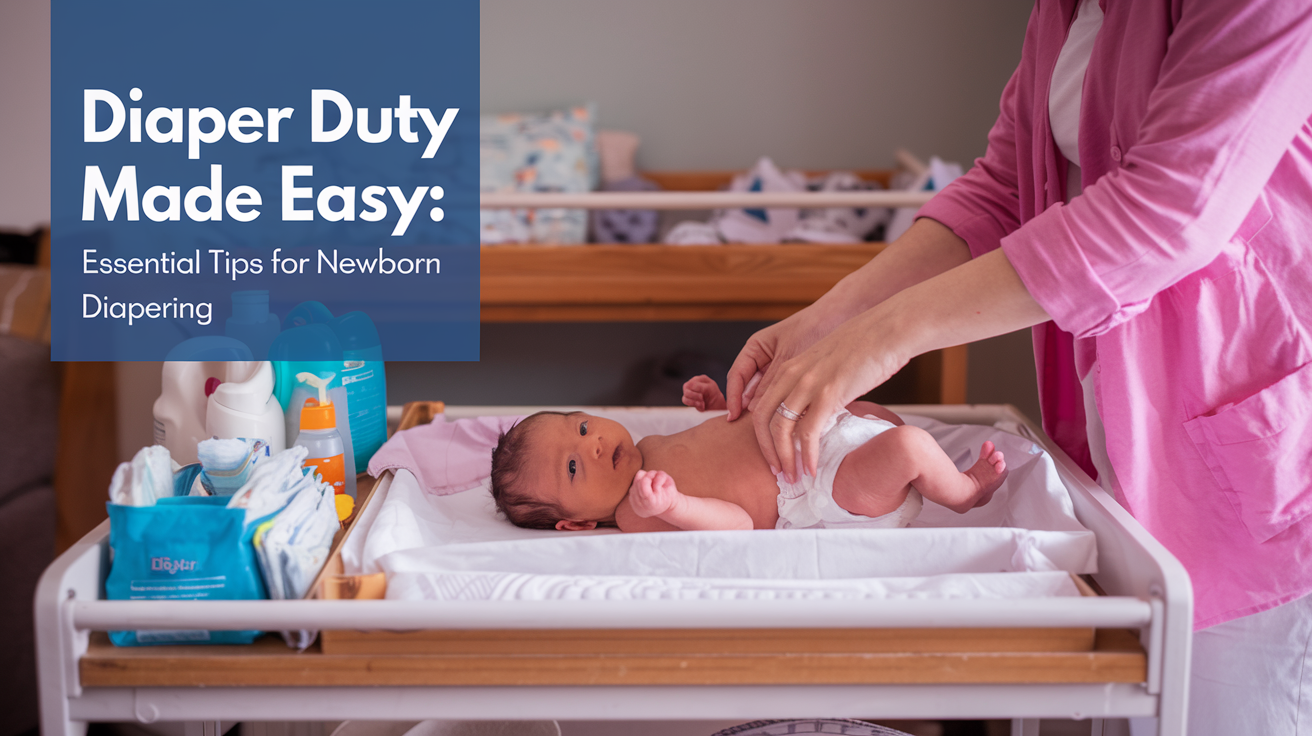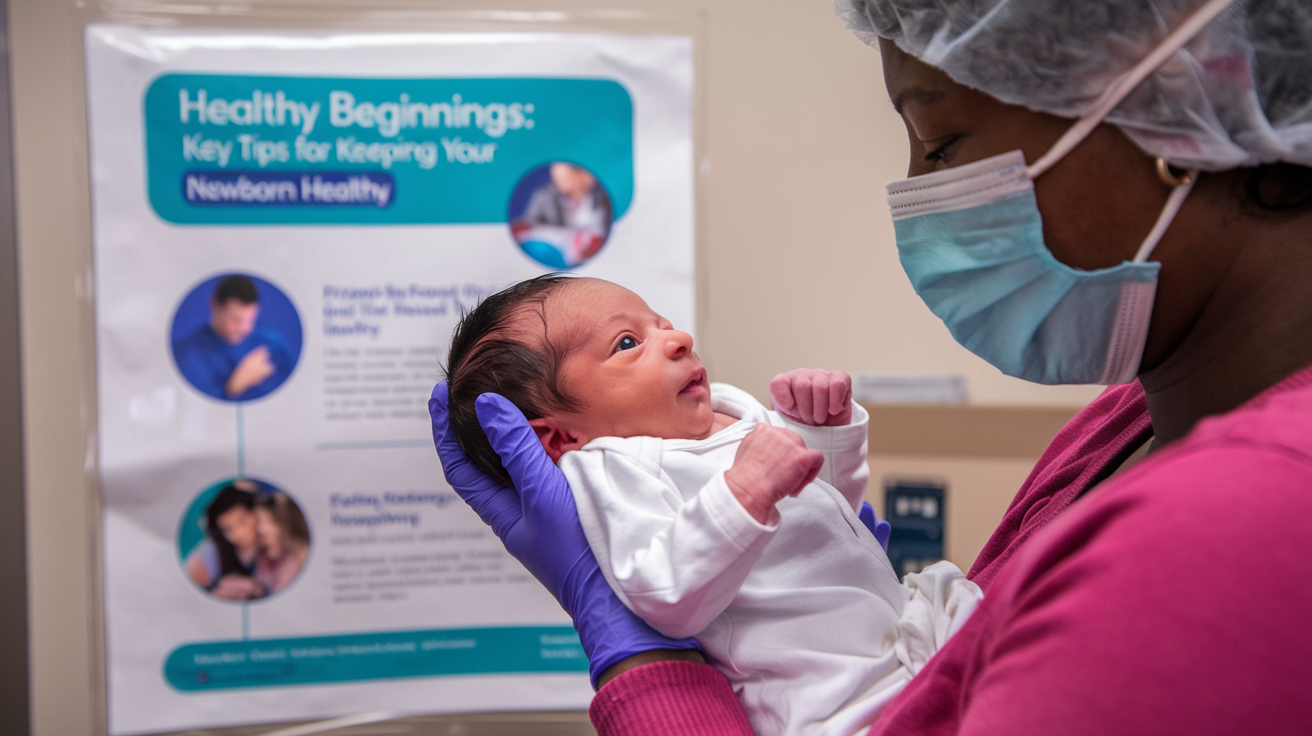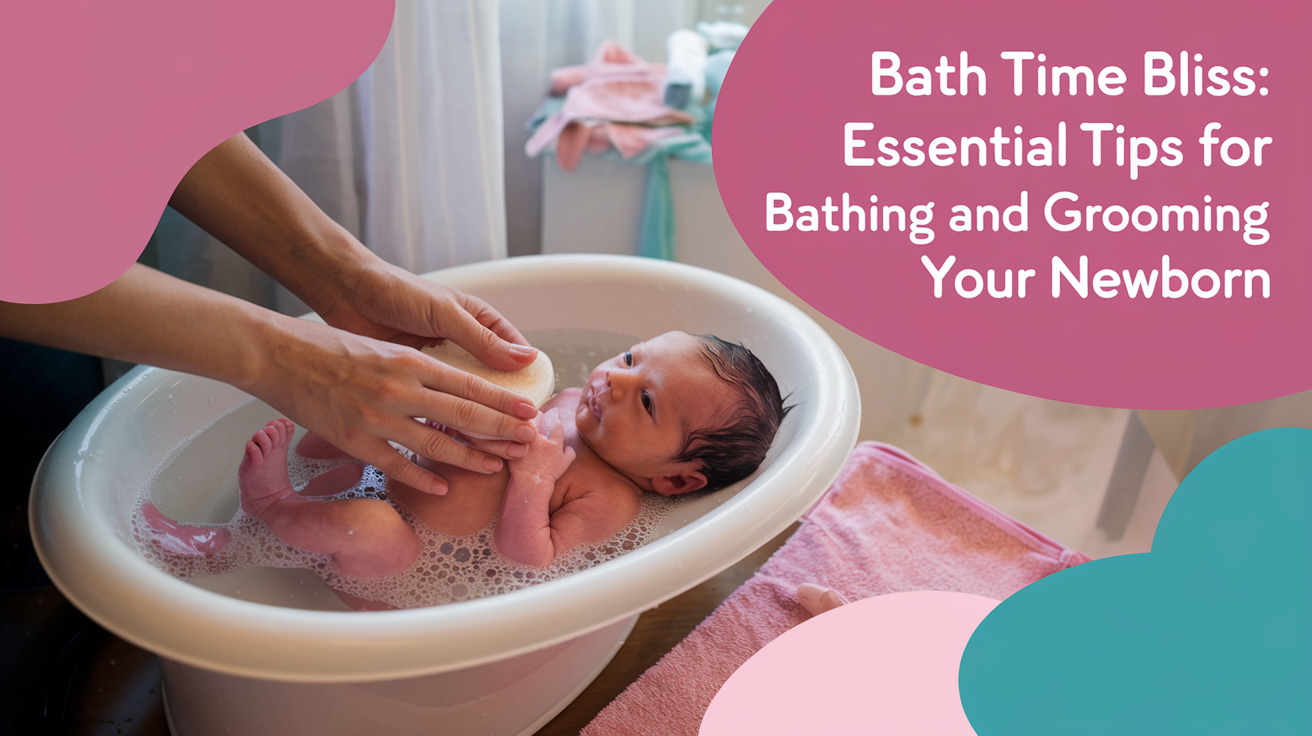Introduction: Mastering Newborn Care with Confidence
Welcoming a newborn into your life is an exhilarating and transformative experience. As new parents, you’re stepping into a world of profound joy and significant challenges. The early days with your baby involve a delicate balance of learning, adjusting, and nurturing, as you discover and respond to your tiny one’s needs. From the first precious moments you hold your baby to those sleepless nights and endless feedings, every experience helps build a loving and secure environment for your newborn.

Navigating Newborn Care: A Journey Like No Other
Newborn care can be both incredibly rewarding and overwhelming. With a flood of information and the constant evolution of your baby’s needs, knowing where to start can be daunting. Understanding the intricacies of feeding, sleeping, and overall infant care is crucial. To simplify this journey, you need a guide that breaks down newborn care essentials into actionable tips and practical advice to help you manage day-to-day parenting demands.
Your Ultimate Guide to Newborn Care Tips
In this article, we will demystify newborn care by diving into the most important aspects of infant care. We’ll cover essential tips on feeding practices, creating a safe sleeping environment, and establishing routines that support both your baby’s development and your own well-being. By applying these insights, you’ll be well-prepared to build a solid foundation for your baby’s early life and handle the various stages of their growth with confidence.
Empowering Your Parenting Journey
Our aim is to offer you practical and compassionate advice. Every baby is unique, and what works for one family might not work for another. Use this information as a starting point, and adapt the recommendations to suit your personal situation and your baby’s individual needs.
As you embark on this incredible journey, remember that parenting is a learning process. Embrace the moments of triumph and navigate the uncertainties with patience. By approaching newborn care with flexibility and utilizing available resources, you can confidently embrace this new chapter and provide the best care for your baby. Let’s dive into the essential tips that will make this journey smoother and more fulfilling.
Feeding Your Newborn

Breastfeeding Tips for Newborn Care
Breastfeeding is a natural process essential for newborn care, but it doesn’t always come easily and may require patience and persistence. Here are some tips to help you get started with breastfeeding:
- Begin breastfeeding as soon as possible after birth, ideally within the first hour. This helps your body start producing milk and provides your baby with their first taste of colostrum, which is rich in nutrients and antibodies crucial for newborn care.
- Ensure the baby latches on properly. A good latch means more effective feeding and less discomfort for you. Your baby’s mouth should cover both the nipple and part of the surrounding areola, not just the nipple.
- Feed on demand. Newborns typically need to be fed every 2 to 3 hours, or about 8 to 12 times in 24 hours. Watch for early signs of hunger, such as stirring, stretching, sucking motions, and lip movements.
- Seek support if you need it. Don’t hesitate to ask for help from a lactation consultant, nurse, or experienced mothers if you’re having difficulty with newborn care.
Formula Feeding Guidelines for Newborn Care
If you opt for formula feeding as part of your newborn care routine, either by choice or necessity, here are some guidelines to follow:
- Choose an iron-fortified infant formula unless advised otherwise by your pediatrician. This helps prevent iron deficiency, which can impact your baby’s growth and development.
- Prepare the formula according to the manufacturer’s instructions. Incorrect preparation can lead to undernutrition or overfeeding issues.
- Like breastfeeding, feed your baby on demand. Most newborns will need about 2 to 3 ounces of formula every 2 to 3 hours.
- Be mindful of hygiene. Always wash your hands before preparing formula and ensure all feeding equipment is sterilized to prevent infections, a crucial aspect of newborn care.
Newborn Sleep
Establishing a Sleep Routine for Newborn Care

Setting a consistent bedtime routine is crucial for newborn care as it helps signal to your baby that it’s time to wind down and go to sleep. Here are some tips to establish a sleep routine:
- Try to put your baby to bed at the same time each night. Consistency helps regulate your baby’s internal clock and makes falling asleep easier.
- Develop pre-sleep rituals such as bathing, singing lullabies, or reading books. These calming activities can signal to your baby that it’s time to transition from wakefulness to sleep.
- Keep the sleeping environment comfortable. Use a firm mattress and maintain a cool, quiet, and dark room. A comfortable sleep environment is essential for effective newborn care.
- Encourage daytime naps at regular times, which help regulate nighttime sleep. Proper daytime napping contributes to better nighttime sleep patterns.
Safe Sleeping Practices for Newborn Care
Ensuring your baby sleeps safely is paramount in newborn care. Follow these recommendations to reduce the risk of SIDS (sudden infant death syndrome) and other sleep-related incidents:
- Always place your baby on their back to sleep, for naps and at night. This is the safest sleeping position to reduce the risk of SIDS.
- Use a firm sleep surface, such as a mattress in a safety-approved crib, covered by a fitted sheet. Soft or plush bedding can pose a suffocation risk.
- Keep soft objects like pillows, quilts, comforters, and toys out of the crib. These items can be hazardous and should be avoided to ensure a safe sleeping environment.
- Avoid overheating. Dress your baby in suitable sleepwear and keep the room at a temperature that is comfortable for a lightly clothed adult. Overheating can increase the risk of SIDS.
- Consider sharing the room with your baby but not the same sleeping surface. Room-sharing can decrease the risk of SIDS by as much as 50%, but it’s important that your baby has their own sleep space.
Dealing with Sleep Regressions in Newborn Care
Sleep regression can occur at various stages in a baby’s first year and beyond. While challenging, understanding that regressions are temporary and normal can help manage them:
- Stay flexible with your routine. If your baby is experiencing a sleep regression, they may need more time to settle or wake more frequently during the night. Adapting your routine as needed can help manage these changes.
- Offer extra comfort and reassurance during this period. A little more cuddling or an additional bedtime story might help your baby feel secure enough to sleep.
- Maintain or even increase daytime naps if your baby seems overly tired. Ensuring your baby is well-rested during the day can contribute to better nighttime sleep.
- Be consistent and patient. While it might be tempting to drastically change your approach during a regression, often the best course is to stick with your established routines as much as possible. Consistency helps reinforce healthy sleep habits.
Diapering Basics in Newborn Care
Choosing the Right Diapers for Newborn Care

When selecting diapers, you have two primary types to consider: cloth and disposable. Each type has its pros and cons:
- Cloth Diapers: These are reusable, environmentally friendly, and can be more economical over time. However, they require regular washing and may involve a more complex cleaning routine.
- Disposable Diapers: These offer unbeatable convenience and are generally more absorbent. While they provide ease of use, they come with a greater environmental cost and can be more expensive over time.
When choosing the size, pay close attention to your baby’s weight and the fit recommendations on the diaper packaging. Proper fit helps avoid leaks and ensures comfort. For babies with sensitive skin, opt for hypoallergenic options that are free from dyes and fragrances to minimize irritation.
Diaper Changing Tips for Newborn Care
Mastering the art of diaper changing is a key aspect of newborn care. Here’s how to make the process smooth and effective:
- Always keep supplies within reach: You will need a diaper, baby wipes, a container for dirty diapers, and, occasionally, diaper rash cream. Having everything at hand makes the process quicker and more efficient.
- Ensure the changing surface is safe and secure: Use a changing table with raised edges or a floor mat to prevent accidental falls. Safety is paramount during diaper changes.
- Clean your baby gently but thoroughly: Avoid rashes by wiping from front to back, especially for baby girls, to prevent infections. Gentle cleaning helps maintain your baby’s delicate skin health.
- Fasten the diaper snugly but not too tight: You should be able to fit two fingers between the diaper and your baby’s stomach to ensure a comfortable fit without causing any discomfort.
- Immediately dispose of the soiled diaper: This helps maintain a sanitary environment and prevents odors. Use a container specifically designed for dirty diapers.
- Washing your hands after every diaper change is crucial: This practice ensures health and hygiene are maintained, protecting both you and your baby from potential infections.
Bathing and Grooming in
Bathing Your Newborn
Initially, until the umbilical cord stump falls off, stick to sponge baths with a warm, damp cloth. Once your baby is ready for tub baths, follow these tips to ensure a safe and enjoyable experience:
- Use an infant tub and fill it with just about two inches of warm water (around 100°F to 102°F). Always test the water temperature with your wrist or elbow to avoid overheating.
- During the bath, support your baby’s head and neck with one hand while gently using the other to wash them with a mild, fragrance-free soap. Start with the face and move downward, keeping soapy water away from their eyes and mouth.
- Never leave your baby unattended in the bath, even for a moment. This ensures their safety and prevents accidents.
- After the bath, wrap your baby in a soft towel immediately, covering their head to prevent heat loss and keep them cozy.
Skincare Tips for Infants
Babies have delicate skin that requires special care. Follow these tips to keep your baby’s skin healthy:
- Use hypoallergenic and unscented products formulated specifically for infants. This includes baby lotion, shampoo, and laundry detergent to avoid skin irritation.
- Moisturize regularly to prevent dryness, especially during colder months. Opt for a gentle, fragrance-free moisturizer that is suitable for sensitive skin.
- Protect against diaper rash by changing your baby’s diaper frequently and applying barrier creams if recommended by your pediatrician. This helps maintain healthy skin and prevents irritation.
- Be mindful of sun exposure: Babies under six months should be kept out of direct sunlight. Use protective clothing and hats when outside to safeguard their sensitive skin.
- Regularly check your baby’s skin for any signs of irritation, dryness, or rash. Address any concerns with your pediatrician promptly to ensure your baby’s skin remains in good health.
Related:
How to Bathe a Newborn: A Gentle, Step-by-Step Guide to Your Baby’s First Baths
Keeping Your Newborn Healthy
Identifying Signs of Illness

Newborns are particularly susceptible to infections due to their developing immune systems. Being vigilant about early signs of illness is crucial for prompt treatment. Watch for these symptoms:
- Fever: A rectal temperature of 100.4°F or higher is considered a fever in newborns.
- Unusual irritability or lethargy: If your baby is more fussy or less responsive than usual.
- Difficulty breathing: Look for signs of labored breathing or flaring nostrils.
- Rash: Any unusual skin changes or rashes should be noted.
- Vomiting or diarrhea: Frequent episodes can indicate gastrointestinal issues.
- Changes in feeding patterns: A significant decrease in appetite or feeding frequency.
- Decrease in wet diapers: Fewer wet diapers than usual might suggest dehydration or illness.
If your baby exhibits any of these signs, it’s essential to contact your pediatrician immediately. Early detection and treatment often lead to better outcomes.
Vaccination Schedule
Vaccinations play a crucial role in protecting your newborn from a range of infectious diseases. The Centers for Disease Control and Prevention (CDC) recommends the following vaccinations starting from birth:
- Hepatitis B: The first dose is usually given in the hospital shortly after birth.
- Rotavirus
- Diphtheria, tetanus, whooping cough (DTaP)
- Influenza type B (Hib)
- Pneumonia
- Polio
Typically, additional doses are administered over the first 18 months of life. Adhering to the vaccination schedule provided by your healthcare provider is vital for effective protection. Vaccinations are a safe and proven method to protect your baby from serious illnesses.
Building Immunity in Newborns
In addition to vaccinations, several strategies can help build and strengthen your newborn’s immunity:
- Breastfeeding: If possible, breast milk provides essential nutrients and antibodies that help protect against infections.
- Avoiding exposure to sick individuals: Limit your baby’s contact with people who are ill to prevent the spread of germs.
- Maintaining a clean environment: Regularly clean and sanitize surfaces and toys.
- Hand hygiene: Ensure everyone who handles your baby washes their hands thoroughly to minimize germ transmission.
- Exposure to different environments: As your baby grows, safe exposure to various settings and gentle play can naturally enhance their immune system.
Related:
Advice For New Moms : 10 Empowering Tips To Thrive
Bonding with Your Baby
Importance of Bonding
The initial hours and days following birth are vital for establishing a strong bond with your newborn. Skin-to-skin contact, or kangaroo care, is an essential practice that helps regulate your baby’s heart rate and temperature while providing comfort for both the baby and the parent. This close physical interaction fosters an emotional connection and contributes to a sense of security.
Bonding is fundamental for your baby’s social, emotional, and cognitive development. A strong early bond creates a solid foundation for a healthy attachment style in later life, supporting your child’s ability to form and maintain healthy relationships as they grow.
Activities to Bond with Your Newborn
Engaging in simple yet meaningful activities can strengthen your bond with your baby. Consider incorporating the following practices into your daily routine:
- Skin-to-skin contact: Holding your baby close against your skin provides soothing warmth and supports emotional and physical development.
- Talking and singing: Your baby recognizes and finds comfort in your voice. Regularly talking and singing to your baby can be both engaging and calming.
- Eye contact: Establishing eye contact during feeding or when holding your baby helps reinforce your connection and bond.
- Gentle touch: Activities like massage, gentle stroking, and cuddling can enhance your baby’s sense of security and affection.
- Reading aloud: Although your baby may not understand the words yet, the rhythm and sound of your voice can be comforting and stimulating.
Conclusion
Newborn care encompasses a wide range of practices that contribute to the well-being and development of your baby. From feeding and sleeping routines to diapering basics and bath time tips, every aspect plays a crucial role in ensuring your baby’s health and happiness. Equally important is the bonding process, which lays the foundation for a strong emotional connection and supports your baby’s growth and development.
By following the guidelines and recommendations outlined in this guide, you can provide the best possible care for your newborn. Whether you’re breastfeeding or formula feeding, establishing a safe sleep routine, mastering diaper changes, or engaging in meaningful bonding activities, each step helps nurture and support your baby during these formative early months. Your attentive care and love are the cornerstones of a thriving, healthy, and happy newborn.
FAQ
1. How often should I feed my newborn?
Newborns typically need to be fed every 2 to 3 hours, or about 8 to 12 times in 24 hours. Whether breastfeeding or formula feeding, it’s important to feed on demand, watching for signs of hunger such as stirring or sucking motions.
2. What are the best practices for safe sleeping for my newborn?
To ensure safe sleeping, place your baby on their back to sleep, use a firm mattress in a safety-approved crib, and keep the sleep area free of soft objects and loose bedding. Room-sharing without bed-sharing is recommended to reduce the risk of SIDS.
3. How do I choose the right diapers for my baby?
You can choose between cloth and disposable diapers based on your preferences. Cloth diapers are reusable and environmentally friendly but require washing, while disposable diapers offer convenience. Always select the appropriate size based on your baby’s weight and opt for hypoallergenic options if your baby has sensitive skin.
4. How often should I bathe my newborn?
Until the umbilical cord stump falls off, stick to sponge baths. After that, you can start giving your baby tub baths. Aim to bathe your baby 2 to 3 times a week, or as needed, to keep their skin clean and healthy.
5. What are the signs that my newborn might be ill?
Watch for signs of illness such as a fever (rectal temperature of 100.4°F or higher), unusual irritability or lethargy, difficulty breathing, a rash, vomiting, or diarrhea. Any significant change in feeding patterns or a decrease in wet diapers can also indicate illness. Contact your pediatrician if you notice any of these symptoms.
6. Why is bonding with my baby important?
Bonding with your baby helps establish a secure emotional connection and supports their social, emotional, and cognitive development. Early bonding through skin-to-skin contact, talking, and gentle touch fosters a healthy attachment and enhances your baby’s ability to form relationships as they grow.
References
- American Academy of Pediatrics (AAP) – Provides guidelines on infant care, safe sleep practices, and vaccinations.
- Website: aap.org
- Centers for Disease Control and Prevention (CDC) – Offers information on vaccination schedules and newborn health.
- Website: cdc.gov
- Mayo Clinic – Resources on breastfeeding, diapering, and general newborn care.
- Website: mayoclinic.org
- La Leche League International – Support and information on breastfeeding and lactation.
- Website: llli.org
- The American College of Obstetricians and Gynecologists (ACOG) – Guidelines on newborn care and postpartum support.
- Website: acog.org
newborn care, breastfeeding tips, newborn sleep, diapering basics, bonding with your baby


Pingback: Colic in Newborns: Discover the Best Ways to Comfort Your Little One -
Pingback: Tummy Sleeping Newborns: Essential Safety Tips and Benefits -